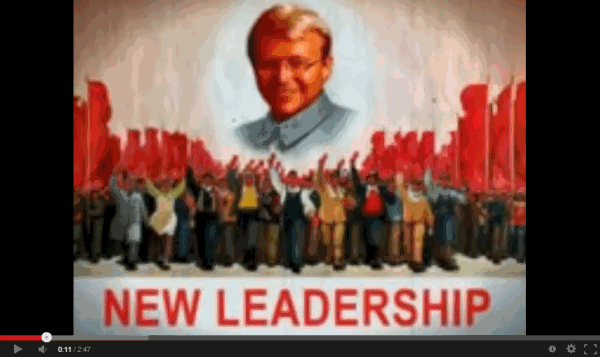A very common political trope in western liberal democracies is for more conservative people to call candidates/policies by less conservative people/parties as communist or socialist or a similar pejorative term. This happens during elections but also during the day to day political process. Everything Obama has done has been painted as something akin to communism. Even if it’s anything but communist — for example the Affordable Care Act is essentially mandating increased participation in a fairly capitalist health insurance marketplace, a far cry from full-on-commie mandatory universal coverage. This is not confined to the US — for non-Australian readers, the above picture is of one-time prime minister Kevin Rudd cast as Chairman Mao.

Now I think it’s clearly nonsense. Even if you’re well to the right of Obama or Rudd, you should be able to tell between them and Stalin — just like we can tell the genuine difference between (say) Ted Cruz or Tony Abbott and Hitler. And surely you’d think someone who’s actually spent decades living in the former Soviet Union would be able to tell the difference?
Not always. The first time I encountered this was a family friend of my parents visiting from the US. It was just before the 2008 US presidential election and she said she was voting for McCain because Obama is too socialist for her and maybe even reminded her of the Soviet Union. “How much Fox News watching is required to get that view?” I thought. A recent case was even more bizarre when a friend was talking about why her Russian grandparents said they voted for Malcolm Turnbull (the Liberal candidate for a local seat — which in Australian politics means more conservative). Basically they said they’ve had enough of that kind of stuff the Labour party stands for in the Soviet Union thank you very much.

Prime Minister Kevin Rudd speaks at the Brisbane Convention and Exhibition Centre during the Labor party campaign launch in Brisbane, Sunday, Sep. 1 2013. (AAP Image/Lukas Coch) NO ARCHIVING
It’ll be a waste of time to go into detail about the differences between the USSR and the Democratic and Labour party policies. One thing is particularly important though. Countries that self-identified as communist didn’t actually live up to many of the left-wing theoretical ideals they espoused, eg. worker’s rights. See a previous post. The natural question is then “shouldn’t someone who’s had the experience themselves know better?”
A slightly related question is played out all the time when a group that’s traditionally been oppressed and marginalised contains members who are shitheads about some other topic. For example, people might lament the existence of gay misogynists, feminist racists, ethnic minority homophobes and so on. Amongst many of my Jewish friends, the lament is more acute because it’s turned towards their community. The lament can be expressed as something like the below:
Many Jewish families came to Australia during and after WWII, where they were fleeing either the impending annihilation of their world or seeking refuge from the aftermath. They had the indelible experience of being endlessly turned away and facing an outside world that completely lacked in empathy. The Jewish community overcame much adversity and established itself successfully in Australia. However, despite the Holocaust experience forming an essential part of the community’s identity, this has not resulted in the community extending the same empathy to the refugees of today. If anything, the community’s overall attitude is one of xenophobia and a total focus on its own welfare, others-be-damned. As a result, they have generally supported Australia’s abominable policy against asylum seekers instead of being a vocal community for humane treatment — with opposing views being few and far between.
A similar theme was powerfully expressed in a recent essay in The Monthly: Why Australia hates asylum seekers. Christos Tsiolkas has the same thoughts about the Greek community he belongs to — being a community of largely 2nd and 3rd generation immigrants, what is the reason for the large-scale racist anti-immigrant feeling? Also, from what I anecdotally know of some Russians who have immigrated to the US or Israel, they often become virulently racist and anti-other-immigrant.
There are two questions here. (1) Why would people from the Soviet Union miss the point about what the Soviet Union was about? (2) Why would immigrants who are so aware of the immigrant experience be so lacking in empathy to other immigrants? Let’s look at the second one. It’s pretty uncontroversial that we humans are very good at not generalising from our experience, not extrapolating to other people and considering ourselves special precious little flowers. For a pretty extreme case, see my old post on anti-choice activists who go in to get abortions because they “really need” them. Our ability to rationalise is very high. There is therefore an element of fetishisation of immigrants/minorities etc if we expect them to behave much differently. I think it’s patronising and sets them up as the other. In fact the holding up of minorities to a higher moral standard (even if it’s framed as being “because” of their suffering) easily becomes the vehicle of more oppression. To quote from Ta-Nehisi Coates’s must-read article:
If you accept that being twice as good is the price of the ticket, then you accept a double standard, and thus necessarily accept the precepts of racism.
So while it may be incredibly frustrating, people who belong to some minority are just as human (all too human) as those who do not. They get to have the same foibles, biases and misunderstandings — although of course in many cases there will be opportunity for special insight because of their experience. Similarly, why would we expect people who have lived in the USSR to necessarily have some special insight on what it was “about”? I don’t think I know what Australia’s “about” today — and I certainly think 95% of other peoples’ opinions on what it’s about are pure bullshit. Rudd is no Mao. Obama is no Lenin. But we will probably all make similar gaffes dozens of times in our lives, in situations when we could have had some special insight become available but didn’t grasp it because we’re human.
From an omniscient viewpoint, these views deserve a facepalm but there’s no such thing as an omniscient viewpoint.





0 Comments